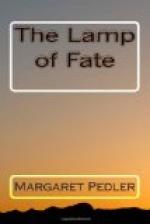“No wonder we are all in love with you!” he exclaimed in low, vehement tones; adding quickly, as he detected a flicker of apprehension in Magda’s eyes: “But you need not fear to dance with me. I will be as your brother—I will go on being ‘decent.’”
And he was. He danced as perfectly as any of his music-loving nationality can dance, but there was a restraint, a punctilious deference about him that, even while it amazed, availed to reassure Magda and restore her shaken confidence in the man.
She did not realise or suspect that just those two simple actions of hers—the good turn she had done Gillian at some considerable cost to herself in the matter of personal pride, and her quick recognition of the musician’s sense of fair play in renouncing his dance with her when he knew the circumstances which had impelled her to promise it—these two things had sufficed to turn Davilof’s heady, emotional devotion into something more enduring and perhaps more dangerous, an abiding, deeply rooted love and passion for her which was stronger than the man himself.
He left the house immediately after the conclusion of his dance with her, and Magda was speedily surrounded by a crowd of would-be partners. But she felt disinclined to dance again, and, always chary of her favours in this respect, she remained watching the dancing in preference to taking any part in it, exchanging small-talk with the men who, finding she could not be induced to reconsider her decision, clustered round her chair like bees round a honey-pot.
It was towards the end of the evening that Michael Quarrington finally joined the group. Magda’s eyes rested on him with a mixture of annoyance and approval—annoyance because she had expected him to ask her for a dance quite early in the course of the programme and he had failed to do so, and approval because he was of that clean-cut, fair-haired type of man who invariably contrives to look particularly well-groomed and thoroughbred in evening kit.
She had no intention of permitting him to request a dance at this late hour, however, and rose from her seat as he approached.
“Ah! You, Mr. Quarrington?” she said gaily. “I am just going home. It’s been a charming evening, hasn’t it?”
“Charming,” he rejoined courteously. “May I see you to your car?”
He offered his arm and Magda, dismissing her little court of disgruntled admirers with a small gracious nod, laid her slim hand on his sleeve. As they moved away together the orchestra broke into the swinging seductive rhythm of a waltz.
Quarrington paused abruptly.
“Don’t go yet!” he said. “Dance this with me.”
His voice sounded strained and uneven. It was as though the words were dragged from him without his own volition.
For an instant the two pairs of eyes met—the long, dark ones with their slumbrous fire brooding beneath white lids, and the keen, hawk-like grey ones. Then:




